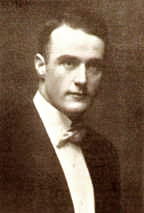 The picture to the left, which was earlier used to illustrate a post describing the original Marquette Law School curriculum, is a photograph of Pamphilus Joseph O’Brien, Law ’15. His is one of the first photographs that we have of an early Marquette law student, other than the photos in the official class pictures.
The picture to the left, which was earlier used to illustrate a post describing the original Marquette Law School curriculum, is a photograph of Pamphilus Joseph O’Brien, Law ’15. His is one of the first photographs that we have of an early Marquette law student, other than the photos in the official class pictures.
O’Brien was born in Wisconsin on May 5, 1889. His parents, John O’Brien and Julia Cruden O’Brien, operated a farm near Randolph, Wisconsin, on the border of Columbia and Dodge Counties. Both parent were of Irish descent. His father was a native of Ireland, while his Wisconsin-born mother was the daughter of Irish immigrants. O’Brien was apparently named in honor of St. Pamphilius, a now somewhat obscure Christian martyr in the early fourth century.
O’Brien appears to have rarely used his unusual first name, which was somewhat difficult to pronounce, and he was generally known as Pam or P.J. (Early Marquette bulletins list him as Pam J. O’Brien.)
At some point in his early life, O’Brien moved to North Dakota, where he attended Valley City Normal College, a teacher training institute. He enrolled in the Marquette Law School in the fall of 1912, at age twenty-three.
As a student at Marquette, O’Brien joined the recently founded Nu Nu chapter of the Theta Nu Epsilon fraternity, a fraternal organization that admitted students at the end of their first year of college. In the early twentieth century, fraternities were major institutions at most American colleges, and Marquette was no exception. Theta Nu Epsilon was not a legal fraternity, but in the 1910’s there was no formal differentiation between law students and undergraduate students when it came to fraternity membership.
O’Brien’s involvement with Theta Nu Epsilon reminds us that the lines between law and college students were not nearly so sharp in that era as they are today. Initially, Marquette required only a high school diploma for admission to the day division of the law school. Then, for more than a decade it required law students to have only a year of college, and that year could be taken in combination with the law course. As a consequence, there was often very little difference in age between students in the college and their full-time counterparts in the law department.
O’Brien was extensively involved with Theta Nu Epsilon, and his involvement continued after he received his law degree in the spring of 1915. Later that year he was elected as a trustee of the national fraternity, and the following year he became one of its national officers.
After graduation from Marquette, O’Brien remained in Milwaukee to practice law. He later married a woman named Hazil Underhill, and at some point the O’Briens moved to California. Pamphilius O’Brien died in Alameda, California, in 1951, shortly before his sixty-first birthday, and just after the thirty-fifth anniversary of his graduation from Marquette.

Professor Hylton,
I am really enjoying your posts about the history of the law school! Thank you,
Jo Futrell, Class of 2010
After posting this profile, it occurred to me that I should also have looked for information concerning “Pam” O’Brien in “The Hilltop,” the Marquette student yearbook that began publishing in 1915, the year of his graduation from Marquette Law School.
He is there, and, as it turns out, O’Brien really did prefer to be called “Pam.” By the time he graduated, he also listed his home town as Fox Lake, Wisconsin.
He was also even more involved in the social life of the law school and the university than I realized. At the law school, he was president of the Class of 1915, as well as the head of the Dean Jenkins Law Club, a voluntary society that provided its members with opportunities to improve their public speaking and debating skills.
At the university level, he was chair of the Dance Committee, served on the inter-fraternity council, and was a member of the staff of the yearbook in its inaugural year. He also played football in 1912 and 1914, and participated in the Marquette intramural bowling league during his final semester of law school.
I also learned that two of the eight faculty affiliates of the Theta Nu Epsilon fraternity (for which O’Brien was a national officer) were law professors Arthur Richter and Max Schoetz.
Although little is known of Pam O’Brien’s post-Marquette career, the yearbook entries praise him for his self-confidence and oratorical skills and predict that he would have a successful career in Wisconsin politics.